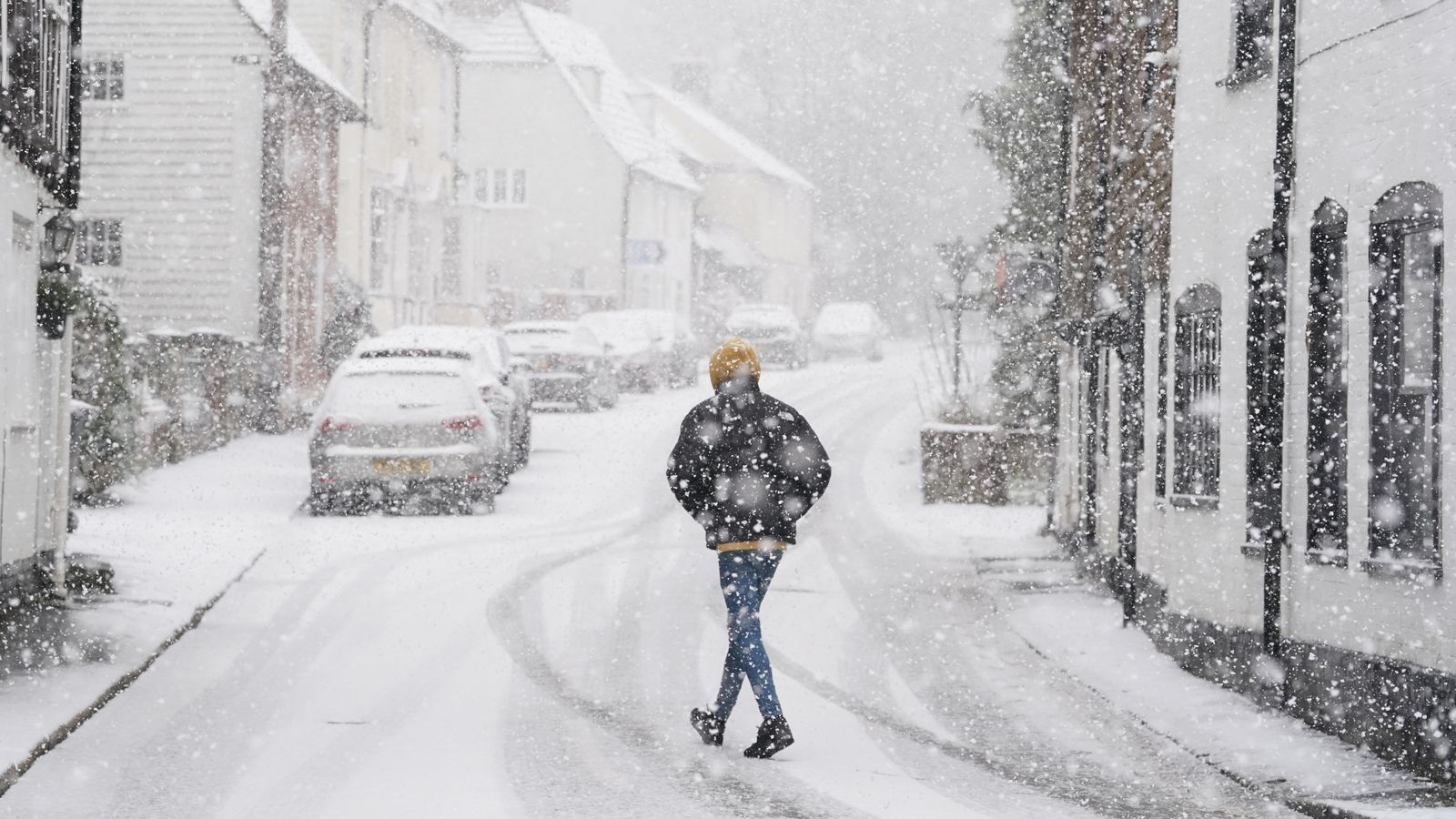Table of Contents
ToggleSnow And Ice Warnings have been Extended Across the Uk
Snow and Ice Warnings Extended Across the UK:
The UK has been enveloped in a wintry landscape as snow and ice warnings have been extended across the uk. with freezing temperatures gripping many regions. The Met Office has issued widespread alerts, urging residents to prepare for potentially hazardous conditions. This weather phenomenon, though picturesque, has caused significant disruptions to daily life, impacting travel, schools, and businesses.
In this article, we’ll cover everything you need to know about the ongoing snow and ice warnings, from the affected areas to safety tips and forecasts. Let’s dive in.
What Areas Are Affected?
The current weather warnings span a vast portion of the UK, with Scotland, Northern England, and parts of Wales facing the most severe conditions. Coastal areas and higher altitudes are experiencing heavier snowfall, while lowland regions are dealing with widespread frost and icy patches.
The Met Office has placed several areas under an amber warning, signaling potential danger to life. For residents in these regions, it’s crucial to avoid unnecessary travel and stay indoors as much as possible. Treacherous conditions, with snow drifts and blocked roads, are being experienced in rural areas.
Read Also: Prince Harry Says He Misses His Old Life in the UK
The Severity of the Current Weather:
This snow and ice episode stands out for its intensity and duration. Experts have compared it to similar weather events from previous years, noting an unusual early winter impact. Temperatures have plummeted below freezing in many areas, with some regions recording lows of -10°C.
The snow accumulation in some parts of Scotland has reached over 30 cm, making it one of the most significant snowfalls in recent years. Strong winds further aggravate the weather conditions, creating a chilling wind factor and reducing visibility.
Impacts on Transportation and Travel:
Transportation networks across the UK are grappling with the challenges posed by snow and ice. Motorways have become gridlocked due to accidents, while minor roads remain impassable in several locations. Authorities are urging drivers to exercise extreme caution, reduce speed, and carry winter essentials in their vehicles.
Train services have also faced disruptions, with delays and cancellations reported across major routes. Heathrow and Gatwick airports warn passengers about potential flight delays, urging them to check their flight status before traveling. Icy roads disrupt public transport schedules, including buses, making navigation dangerous.
Essential Safety Tips for Travelers
- Ensure your vehicle is equipped with winter tires and de-icer.
- Keep blankets, water, and non-perishable snacks in your car.
- Walk slowly and wear sturdy footwear to prevent slips.
School and Workplace Closures:
The freezing conditions have forced the closure of hundreds of schools, leaving parents scrambling to make alternate childcare arrangements. Local councils are prioritizing the safety of students and staff, especially in areas where transportation is compromised.
.For workplaces, remote work has become the go-to solution as companies prioritize employee safety. However, industries reliant on on-site operations, like construction and retail, are facing productivity losses.
Implications for the Energy Sector:
With the cold snap comes a spike in demand for heating, putting pressure on the energy grid. Homeowners are advised to conserve energy where possible by sealing drafts and using energy-efficient heating methods.
This weather also serves as a reminder of the importance of renewable energy sources in mitigating the risks of unpredictable weather patterns
Cold weather poses a significant risk to vulnerable populations, including the elderly, young children, and individuals with pre-existing health conditions. Prolonged exposure to low temperatures can lead to serious health issues, such as hypothermia and frostbite, particularly for those who lack adequate heating in their homes.
Community initiatives have ramped up to provide assistance to at-risk individuals. Local councils and charities are setting up warming centers and distributing blankets, food parcels, and portable heaters to those in need. Residents are encouraged to check on their neighbors, especially if they live alone, to ensure they have the necessary resources to stay safe.
Simple Ways to Help:
- Donate to local shelters or food banks.
- Volunteer to deliver supplies to those unable to venture out.
- Share information about community resources with those who may need it.
Weather Forecast for the Coming Days:
The Met Office warns that the current snow and ice conditions are likely to persist over the next few days. While some areas may see a brief respite, a secondary cold front is expected to sweep across the UK by the weekend.
Temperatures are predicted to remain below freezing in northern regions, with southern areas experiencing slightly milder conditions. Snowfall is likely to continue in higher altitudes, while lowlands may deal with freezing rain and black ice.
Preparing for Prolonged Cold
- Stock up on essential supplies to avoid unnecessary trips.
- Ensure your home is well-insulated and heating systems are functioning properly.
- Stay tuned to weather updates from reliable sources like the Met Office.
Role of the Met Office in Weather Alerts:
The Met Office plays a critical role in issuing timely warnings to help residents prepare for adverse weather. Using advanced meteorological tools, they provide updates on the severity and duration of snow and ice conditions, ensuring that people can take necessary precautions.
Their color-coded warning system—yellow, amber, and red—makes it easy to understand the level of risk associated with specific weather events. Checking their website or app regularly can help you stay informed about the latest developments.
Economic Impact of the Snow and Ice:
The economic toll of extended snow and ice conditions is substantial. Business operations have been disrupted, particularly in retail, delivery, and construction sectors. Delays in transportation have led to supply chain interruptions, affecting goods’ availability and prices.
Local councils also face increased expenses for snow removal and road maintenance. The cost of gritting roads, repairing damage caused by freezing temperatures, and managing emergency services quickly adds up.
Environmental Perspective
While snow may create beautiful landscapes, the sudden drop in temperatures can have significant effects on the environment. Wildlife struggles to find food and shelter, with some species facing life-threatening conditions. Birds, for instance, expend extra energy to stay warm, making bird feeders an essential lifeline.
Moreover, experts suggest that the unpredictability of these weather patterns may be tied to climate change. Rising global temperatures can lead to more erratic and extreme weather events, including severe cold snaps.
How to Stay Informed:
Staying informed is crucial during severe weather conditions. Reliable apps like the Met Office app or websites such as BBC Weather provide real-time updates and localized alerts.
Other Useful Sources
- Local radio stations for community-specific updates.
- Social media accounts of local councils and emergency services.
- Neighborhood groups or forums for immediate support.
Historical Context of Snow Events in the UK:
The UK has experienced numerous significant snow events over the years, some of which have left lasting impressions. The winter of 1963, for example, remains one of the coldest on record, with snow covering the ground for weeks. Similarly, the “Beast from the East” in 2018 brought the country to a standstill, highlighting the need for better preparation and infrastructure.
Learning from these events, the UK has improved its response to adverse weather, but the current conditions serve as a reminder that nature can still be unpredictable.
Read Also: Prince Harry Says He Misses His Old Life in the UK
Conclusion:
Snow and ice warnings across the UK emphasize the importance of staying prepared and informed. From transportation disruptions to community impacts, these weather conditions affect every aspect of daily life. By taking proactive measures, such as following safety tips and checking on vulnerable individuals, we can navigate these challenges more effectively.
Remember to monitor weather updates regularly and prioritize safety during this period. The beauty of snow may be enchanting, but preparedness is key to weathering the storm.
FAQs:
1. What should I do if I’m stuck in traffic during heavy snow?
Stay calm, keep your engine running to stay warm, and make sure your exhaust pipe is clear of snow. If possible, call emergency services for assistance and inform others of your situation.
2. Are there penalties for ignoring travel advisories?
While not penalized legally, ignoring advisories can put you and others in danger. Emergency services may also be delayed in reaching you due to adverse conditions.
3. How can I check if my child’s school is closed?
Most schools update parents through direct communication or via their websites. Local council websites also provide closure updates.
4. What assistance is available for vulnerable individuals?
Local councils and charities often set up warming centers and distribute essential supplies. Contact your local authorities for specific programs in your area.
5. Can I claim compensation for travel delays due to weather?
Compensation depends on the circumstances. Airlines and train services may offer refunds or rescheduling for cancellations, but extreme weather is often considered beyond their control.




